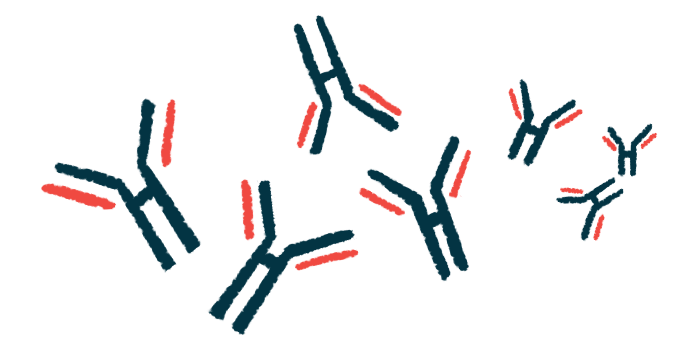Treatments for Lupus May Reduce Response to COVID-19 Vaccination
Lower response to vaccination translates to a higher risk of COVID-19 infection

Antibodies mounted against COVID-19 in the three to six months following vaccination were lower in patients undergoing treatment for lupus than in healthy people, a study has found.
Patients with untreated lupus (also called systemic lupus erythematosus, or SLE) showed a similar level of antibodies as healthy people. Fewer antibodies in treated patients were largely explained by the use of glucocorticoids and rituximab, but could be explained to a lesser extent by other immunotherapies, data show.
This reduced response “likely translates into a higher probability of COVID-19 infection,” researchers wrote. Once confirmed in a larger group, the findings “might help to inform recommendations in vaccination protocols for SLE patients, especially for those under Glucocorticoids and/or Rituximab regimens,” they added.
The study, “Glucocorticoids’ treatment impairs the medium-term immunogenic response to SARS-CoV-2 mRNA vaccines in Systemic Lupus Erythematosus patients,” was published in the journal Scientific Reports.
Throughout the COVID-19 pandemic, numerous reports have supported the hypothesis that people with autoimmune and inflammatory diseases may be at higher risk of developing severe complications from the infection.
It has also been suggested that the efficacy of COVID-19 vaccines may be lower in people with compromised immune systems, but there isn’t enough data to understand how people with specific autoimmune diseases and under different treatment regimens might respond.
A few studies have investigated vaccine responses in SLE patients, but most have focused on the first few weeks after vaccination, the researchers noted.
Study investigated patient response 3 to 6 months after COVID-19 vaccination
The team based in Spain sought to evaluate the response to COVID-19 vaccination in the “medium term” — three to six months after full vaccination — in SLE patients undergoing various therapy regimens, compared with healthy individuals.
While each vaccine works differently, they all broadly act to stimulate a person’s immune system to produce its own antibodies against the virus. If the body is later exposed to the virus, the immune system will recognize it and be better prepared to fight it off.
In the study, the researchers measured the levels of circulating virus-neutralizing antibodies as a surrogate marker of protection against the virus.
Blood samples were collected from 39 patients (median age of 53 years) diagnosed with lupus and 37 healthy participants (control group; median age of 38 years), all without a history of symptomatic COVID-19 infection. Most participants were women (85.5%).
A total of 10 SLE patients were untreated, while 10 others were receiving first-line treatment (hydroxychloroquine), 10 were receiving second-line therapies (methotrexate, azathioprine, mycophenolate mofetil), and nine were on third-line medications (rituximab, belimumab). Thirty patients were also using glucocorticoids, a type of steroid treatment.
All participants were fully vaccinated with Moderna or Pfizer COVID-19 vaccine
All participants received a full, two-dose schedule of either Moderna’s or Pfizer’s COVID-19 vaccine. While use of the two vaccines was roughly equal among controls, more lupus patients received the Moderna vaccine (69%) than the Pfizer one. The median time of blood sampling after vaccination was 3.4 months.
Healthy controls had the highest levels of neutralizing antibodies, which were similar to the levels seen in untreated SLE patients. Treated patients showed significantly lower antibody levels compared with controls.
Specifically, patients on first-line treatment with hydroxychloroquine had an estimated 73% decrease in antibody levels, while those on second-line therapies showed a 56% decrease, and third-line treatment users saw a 72% decrease compared with controls. Patients using glucocorticoids had a 74% decrease in antibody levels compared with non-users.
Three SLE patients had antibody levels that were below the detection threshold.
After controlling for sex, age, time from vaccination, vaccine type, and glucocorticoid use — all factors that could influence the potential findings — the researchers found that while those using first- or third-line therapies still had significantly lower levels of antibodies compared with controls, most of the difference could be explained by a strong effect of glucocorticoid use. The same was not true for patients who were on second-line treatments.
Patients using first- or third-line therapies with glucocorticoids showed significant declines in antibody levels relative to controls, whereas those not using glucocorticoids did not.
A longer time since vaccination was also associated with lower antibody levels — an estimated 48% decrease in antibodies per month since vaccination.
When looking more specifically at individual medications, the researchers found the use of rituximab might drive the differences between third-line medication users and controls in the absence of glucocorticoids. Patients on rituximab had an 89% decrease in antibody levels compared with healthy controls, whereas those using belimumab had a 7% decrease.
“Although suggestive, these results at the drug level are exploratory in nature and should be interpreted with caution due to the low sample size available for the analyses,” the researchers wrote.
Overall, the findings point to lower antibody levels in treated SLE patients. “This decrease in [antibody levels] are likely to be correlated with the probability of infection and, hence, might have implications in the vaccination protocols establish for SLE patients,” the researchers wrote.
They cautioned that the therapy regimen was considered a surrogate for disease severity in this study, “therefore, it was not possible to discriminate in our data the impact of the different therapeutic options from that of the SLE conditions with a higher severity.”








